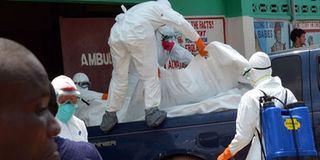Sierra Leone in Ebola lockdown

Liberian Red Cross health workers wearing protective suits carry the body of an 18-month-old baby, a victim of the Ebola virus, on September 12, 2014 in a district of Monrovia. Sierra Leone on September 19, 2014 launched a controversial three-day shutdown to contain the deadly spread of the Ebola virus. PHOTO| AFP
What you need to know:
- Most of Sierra Leone’s population of six million were confined to their homes from midnight, with only essential workers such as health professionals and security forces exempt from the lockdown
- The extreme move comes amid mounting global concern over the Ebola epidemic, which has so far killed more than 2,600 people in west Africa
FREETOWN, Friday
Sierra Leone on Friday launched a controversial three-day shutdown to contain the deadly spread of the Ebola virus, as the UN Security Council declared the deadly outbreak a threat to world peace.
Most of Sierra Leone’s population of six million were confined to their homes from midnight, with only essential workers such as health professionals and security forces exempt from the lockdown.
Almost 30,000 volunteers will go door-to-door to educate locals and hand out soap, in an exercise that could lead to scores more patients and bodies being discovered in people’s homes.
Health experts have criticised the shutdown, arguing that coercive measures to stem the epidemic could backfire and be extremely hard to implement.
Doctors Without Borders (MSF) warned that lockdowns may end up driving people underground “and jeopardise the trust between people and health providers”.
But Sierra Leone President Ernest Koroma said that if the population were to heed the volunteers’ advice, “the campaign will greatly help to reverse the increasing trend of the disease transmission and become a very big boost to our collective effort to stop the outbreak.”
“These are extraordinary times and extraordinary times require extraordinary measures,” added Koroma in a message broadcast on television and radio.
The extreme move comes amid mounting global concern over the Ebola epidemic, which has so far killed more than 2,600 people in west Africa.





